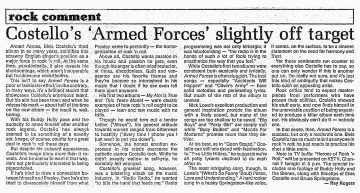University of Nebraska Omaha Gateway, February 9, 1979: Difference between revisions
(fix link) |
(add transcribed text remove Category:Transcription needed) |
||
| Line 5: | Line 5: | ||
{{:US publications by state index}} | {{:US publications by state index}} | ||
{{Bibliography article header}} | {{Bibliography article header}} | ||
<center>rock comment</center> | |||
<center><h3> Costello's 'Armed Forces' slightly off target </h3></center> | <center><h3> Costello's 'Armed Forces' slightly off target </h3></center> | ||
---- | ---- | ||
| Line 10: | Line 11: | ||
---- | ---- | ||
{{Bibliography text}} | {{Bibliography text}} | ||
''Armed Forces'', Elvis Costello’s third album in as many years, solidifies this scrawny English singer’s position as a major force in rock ‘n roll, At the same time, paradoxically, it also reveals his shortcomings, which aren’t insuperable but troublesome nevertheless. | |||
This isn’t to say ''Armed Forces'' is a poor or lackluster effort; on the contrary, in many ways, it’s a brilliant record that showcases Costello’s enormous talent. But his aim has been truer, and when he misses his mark — about half of the time on the new album — the result is, well, boring. | |||
With his Buddy Holly pose and the audacity to name himself after another rock legend, Costello has always seemed to be something of a novelty act. Image, of course, counts for a great deal in rock ‘n roll these days. | |||
But despite his outward appearance Costello’s image blurs more than it reveals. And he seems to want it that way. He’s not particularly interested in being pigeon-holed. | |||
If he's tried to draw a connection between himself and Presley, then he's also tried to disassociate himself from what Presley came to personify — the homogenizatlon of rock ‘n roll. | |||
Above all, Costello wants passion in his music and passion he gets, even though his anger is often misdirected or, at times, directionless. Guilt and vengeance are his favorite themes and they've become so intertwined in his music that I doubt if he can even tell them apart anymore. | |||
His first two albums — ''My Aim Is True'' and '' This Years Model ''were classic examples of how rock ‘n roll ought to be | |||
played — lean and raw music with no frills. | |||
Though he could turn out a tender ballad ("[[Alison]]"), his general attitude towards women ranged from bitterness to hostility (“Every time I phone you I just want to put you down"). | |||
Somehow, the honest emotion expressed in his music overcame the pathetic stance Costello took. While he didn’t exactly wallow in self-pity, he certainly felt wronged. | |||
Costello’s greatest song, however, was a blistering attack on the music industry. In “[[Radio, Radio|Radio Radio]],” he wanted to bite the hand that feeds me.” Radio programming was not only lethargic: It was lobotomizing — ‘the radio is in the hands of such a lot of fools trying to anesthetize the way that you feel." | |||
While Costello’s first two albums were consistent both musically and lyrically, Armed Forces is often sluggish. The best songs — especially "[[Accidents Will Happen]]" and “[[Oliver's Army]]” — have solid melodies and penetrating lyrics. But much of the rest of the album is uneven. | |||
[[Nick Lowe]]’s excellent production and general inspiration provide the album with a lively sound, but many of the songs are too shallow to be saved. "[[Big Boys]]” and “[[Party Girl]]” are simply dull while “[[Busy Bodies]]” and "[[Moods For Moderns]]” promise more than they deliver. | |||
At his best, as in “[[Goon Squad]],” Costello can still mix dread with fascination. In ‘[[Two Little Hitlers]],” he suggests we’re all petty tyrants destined to do each other in. | |||
The most intriguing song, though, is Lowe’s “[[(What's So Funny 'Bout) Peace, Love And Understanding?|(What's So Funny ‘Bout) Peace, Love and Understanding]].” A hard rocker sung in a husky [[Bruce Springsteen|Springsteen]]-like voice, it seems, on the surface, to be a sincere statement on the need for harmony and trust. | |||
Yet those sentiments run counter to everything else Costello has to say, so one can only wonder if this is another put on I’m really not sure, and it’s just this kind of ambiguity that makes Costello such an appealing artist. | |||
Rock critics tend to expect master pieces from performers who have proven their abilities. Costello showed his stuff early, and now finds himself in the unenviable position of being expected to produce a killer album each time out. He obviously can’t do it — nobody can, | |||
In that sense, then, ''Armed Forces'' is a success, but only a moderate one. Elvis Costello has as much talent as anyone in rock ‘n roll; he just needs to practice his shot a little more. | |||
Note to TV buffs: “Heroes of Rock ‘n Roll,” will be presented on KETV, Channel 7 tonight at 8 p.m. The special includes rare footage of Buddy Holly and the Stones, along with film clips of Elvis Costello and Bruce Springsteen. | |||
| Line 45: | Line 82: | ||
[[Category:Album reviews]] | [[Category:Album reviews]] | ||
[[Category:Armed Forces reviews]] | [[Category:Armed Forces reviews]] | ||
Revision as of 13:12, 6 November 2016
|

